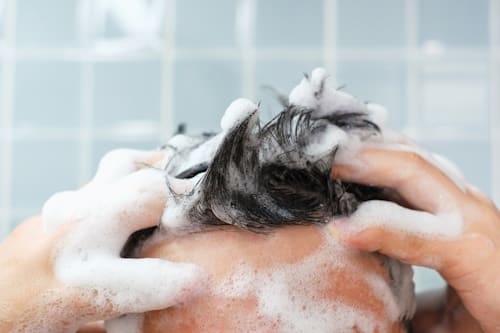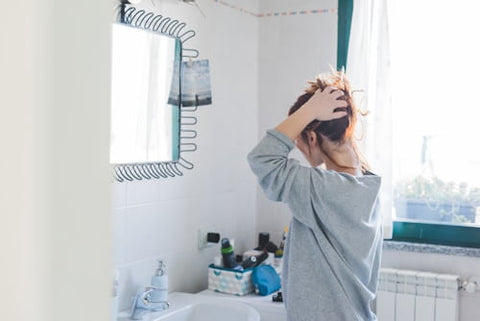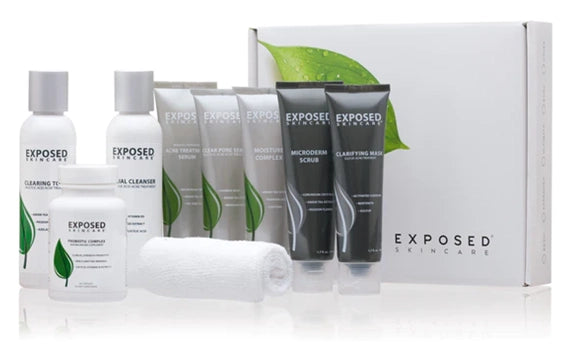Most of us use shampoo regularly without a second thought. It's an integral part of our hair care routine. But for some, the simple act of washing hair may be contributing to an unexpected problem: acne. The question "Can shampoo cause acne?" might initially seem odd.
However, many are beginning to make the connection between their hair care products and skin issues. This article will delve into the relationship between shampoo and acne breakouts, highlighting the specific ingredients and scenarios that might be the culprits.
Also read: How to choose the best acne treatment
Biggest Take-Aways:
- Shampoos and hair-care products contain ingredients that can clog pores and contribute to acne.
- Breakouts commonly occur on the forehead, hairline, and upper back due to hair product residue.
- To reduce the risk of breakouts, it's essential to understand and avoid the offending ingredients in shampoos and hair-care products.
- Exposed Skin Care offers a targeted skincare solution that can help counteract the acne-causing effects of hair products.

How Shampoo Might Be Causing Your Acne
The connection between acne and shampoo is more common than you might think. Here's a closer look at how the two might be related:
Ingredients in Shampoos and Their Effects
Several ingredients commonly found in shampoos can potentially cause acne:
- Cocoa butter and Coconut oil: These are heavy moisturizing agents. While they make your hair soft and smooth, they might clog pores if they come into contact with your skin.
- Shea Butter and Jojoba oil: They are fantastic for hair but can lead to acne breakouts if they clog your pores.
- Sulfates: Often found in shampoos to produce lather, they can irritate those with sensitive skin.
- Petroleum: This ingredient is known for clogging pores and leading to breakouts.
- Other comedogenic ingredients: Ingredients like shea butter and certain oils can be acne-causing when they come into contact with the skin.
Areas Prone to Acne from Hair Products
The type of acne caused by hair products is so common that there’s a medical name for it. People develop numerous closely packed bumps. Here are common areas:
- Forehead and Hairline: Breakouts on your forehead or bumps along your hairline are usually a direct result of hair products coming into contact with your skin.
- Upper Back and Shoulders: When rinsing out your shampoo, it runs down your upper back and, if not washed properly, can cause breakouts.
- Nape of the Neck and Back of your Neck: Similar to the upper back, this area can experience acne if shampoo residue remains.

The Relationship Between Conditioners and Acne
While this article mainly focuses on shampoo, it's essential to note that conditioners and other hair care products could also contribute to your breakouts. Conditioners, especially those with heavy moisturizers like coconut oil or shea butter, can clog pores and cause acne, particularly along your hairline or on the upper back.
Recognizing if Your Shampoo is Causing Your Acne
While the question "Can shampoo cause acne?" has been established as a possibility, it's crucial to determine if it's your shampoo causing the breakouts. Here are some signs:
- Timing of Breakouts: It might be the culprit if you've never had acne and suddenly notice breakouts after switching to a new hair product.
- Location of Acne: Acne-prone areas due to shampoo usually include the forehead, hairline, upper back, and nape of the neck. If you're seeing pimples or flesh-colored bumps called whiteheads in these areas, your hair product might be to blame.
Choosing the Best Hair Care for Clear Skin
To maintain clear skin while also keeping your hair clean and healthy, consider these steps:
- Opt for Non-Comedogenic Products: These are designed not to clog pores. While they might be a bit pricier, they're worth it to avoid breakouts.
- Rinse Thoroughly: After applying shampoo and conditioner, rinse thoroughly to prevent any residue from causing breakouts.
- Avoid Heavy Moisturizers if You Have Acne-Prone Skin: If you have acne-prone or sensitive skin, you might want to avoid hair care products with heavy moisturizers like coconut oil or shea butter.
- Keep Hair Off Your Face: If you use many hair products or have long hair, try to keep your hair pulled back and away from your face as much as possible. This can help prevent oils and product residue from contacting your skin.

Washing Techniques for Acne Prevention
Your washing technique can significantly ensure that hair products don't lead to acne breakouts. Here are some suggestions:
- Wash Your Face After Your Hair: After washing and rinsing your hair, ensure you wash your face last. This helps remove any shampoo or conditioner that might have come into contact with your facial skin.
- Shower Regularly After Using Styling Products: If you use a lot of styling products, it's a good idea to shower before bed to prevent these products from transferring to your pillowcase and then to your face.
- Use a Separate Towel for Your Face: This might seem trivial, but using a separate, clean towel for your face can ensure that residues from your hair aren’t transferred onto your facial skin.
Alternative Hair Care Products
If you suspect that your shampoo is causing your acne, it might be time to explore alternatives:
- Dry Shampoo: While this shouldn't replace regular washing, it can be a good alternative for in-between washes. However, select ones without pore-clogging ingredients.
- Natural Oils: If your hair needs moisturizing, consider lighter oils like argan oil, which is less likely to cause acne.
- Sulfate-Free Shampoos: These can be gentler on the scalp and skin, reducing the chances of breakouts.
Benefits of Using Exposed Skin Care to Manage Acne
Acne is a common skin issue many grapple with. It is often caused by various factors, from hair-care products to dead skin cells accumulating on our faces. A dedicated skincare routine is a significant way to manage and reduce acne. This is where Exposed Skin Care steps in.
Here are the benefits of Exposed Skin Care:
- Targeted Solutions for Different Skin Types: No matter your skin type, Exposed Skin Care offers tailored solutions to address unique skin challenges.
- Reduction in Blackheads and Whiteheads: These products not only help reduce blackheads but are also efficient in treating those tiny flesh-colored bumps called whiteheads that appear along your hairline.
- Fewer Breakouts from Hair Products: If you've ever suspected many hair products of causing breakouts, especially around your hairline, Exposed Skin Care can act as a barrier. It ensures that oil, which can clog pores, leading to clogged pores, is kept at bay.
- Protects from Harmful Ingredients: If you want to avoid shampoos and hair-care products that contain a lot of oil or other ingredients leading to breakouts, using Exposed skincare can provide added protection.
By incorporating Exposed Skin Care products into your daily routine, you can significantly reduce the chances of products causing acne and enjoy clearer, healthier skin.
Conclusion
In our quest for flawless skin and perfect hair, we often forget that the products we use, especially on our hair, might have unintended consequences for our skin. Products contain many ingredients, and certain ingredients in shampoos, specifically, can contribute to acne.
This is particularly true when those ingredients include heavy oils that can clog our pores. As a result, many people get whiteheads and those tiny flesh-colored bumps, especially around the hairline.
When these breakouts happen, it's easy to blame everything but our shampoo. However, to genuinely get to the root of the problem, carefully examining all products used is essential. To avoid the ingredients causing these issues, selecting the right shampoo without the offending compounds is critical.
A proven skincare regimen, like that provided by Exposed Skin Care, can play a pivotal role in combating the effects of such products, ensuring skin remains vibrant and healthy.
FAQs
Can shampoo cause acne?
Yes, certain ingredients in shampoos can contribute to acne, especially if they clog pores.
Which areas are most prone to acne from hair products?
Common areas include the forehead, hairline, upper back, and the nape of the neck.
What type of ingredients in shampoos should I avoid?
Avoid ingredients like heavy oils, sulfates, and petroleum, as they can clog pores and lead to breakouts.
How can I protect my skin from acne caused by hair products?
Adopting a dedicated skincare routine and ensuring thorough rinsing of hair products can help. Using products like Exposed Skin Care can also offer added protection.
What is Exposed Skin Care?
Exposed Skin Care offers tailored skincare solutions to various skin challenges, including those caused by hair products. It provides an effective barrier against ingredients that can contribute to acne.



















